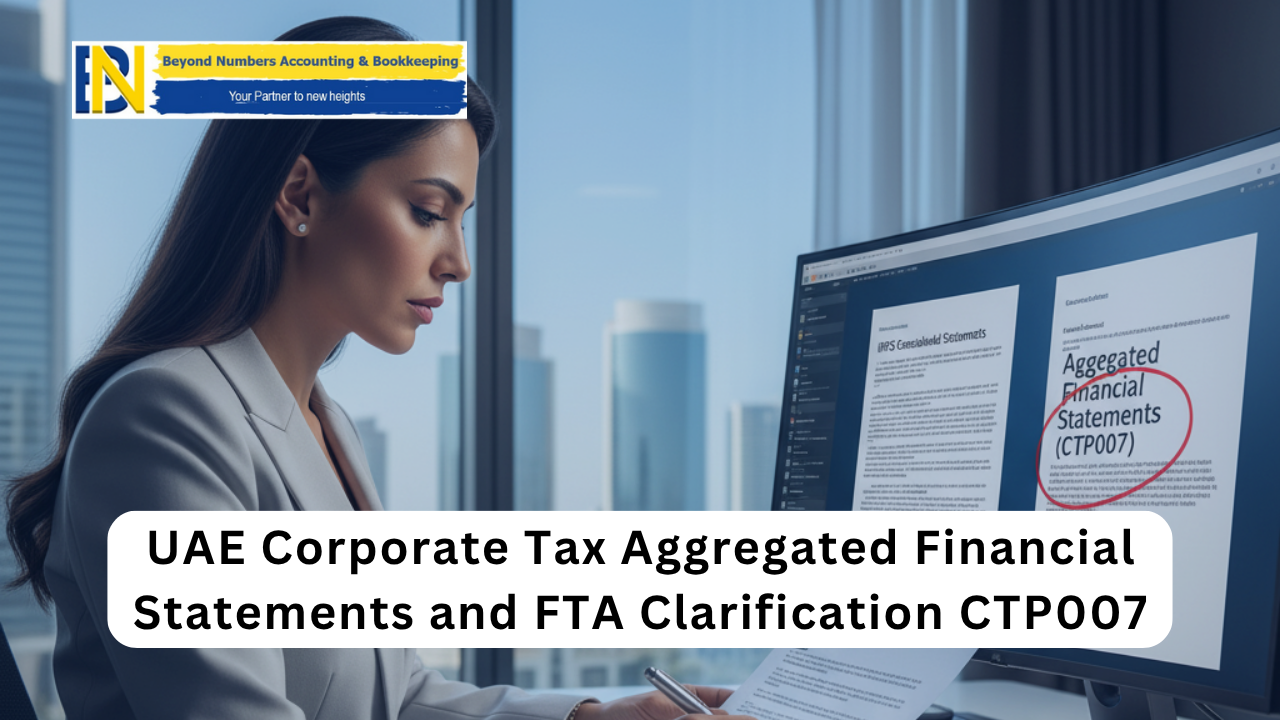The strategic introduction of the UAE Corporate Tax (CT) regime, effective for financial years commencing on or after June 1, 2023, represents a pivotal moment in the nation’s economic regulatory landscape. For businesses that have leveraged the strategic turning point of forming a Tax Group – a mechanism that treats multiple qualifying entities as a single taxable person – a new layer of precision has been mandated. The Federal Tax Authority (FTA) has crystallized the reporting requirements with the issuance of Federal Administrative Decision No. 7/2025 and, subsequently, the highly crucial Public Clarification CTP007, which specifically addresses the preparation and audit of Aggregated Financial Statements (AFS).
The core philosophy underpinning a Tax Group is to streamline compliance and enable the offsetting of profits and losses across the constituent entities, thereby simplifying the computation of the Taxable Income. However, this structure necessitates a distinct financial reporting framework that deviates purposefully from standard International Financial Reporting Standards (IFRS) consolidation principles. This landmark move towards specialized tax-centric reporting underscores the government’s commitment to both transparency and a globally competitive commercial ecosystem.
The Mandate of Aggregated Financial Statements (AFS)
Aggregated Financial Statements are strictly special-purpose financial statements whose sole prerogative is the accurate determination of a Tax Group’s Taxable Income. They are not intended for general public or investor consumption, which is a distinction you, as a business owner or financial officer, must clearly delineate.
The requirements for AFS are structured and definitive, demanding uniform accounting policies across all members to ensure comparability and consistency. CTP007 and Decision No. 7/2025 stipulate that the AFS must be prepared by aggregating the standalone financial statements of the Parent Company and each Subsidiary member of the Tax Group, followed by the compulsory elimination of transactions and balances between them.
Key Components Mandated in the Aggregated Financial Statements:
The full set of Aggregated Financial Statements that must be prepared and maintained includes four primary statements, ensuring a comprehensive presentation of the aggregated financial position and performance:
- Aggregated Statement of Financial Position.
- Aggregated Statement of Profit or Loss.
- Aggregated Statement of Other Comprehensive Income.
- Aggregated Statement of Changes in Equity.
Crucially, a Statement of Cash Flows is not explicitly mandated within this specialized tax framework, which further distinguishes AFS from traditional IFRS consolidated statements.
Navigating the Special Purpose Framework and IFRS Deviations
While the standalone financial statements of member entities should generally comply with IFRS or IFRS for SMEs, the process of aggregation under CTP007 necessitates several strategic adjustments that deviate from the IFRS framework, particularly concerning business combinations. This is a primary area where proactive planning and professional consultation are imperative.
| Area | IFRS Consolidation Principle (Standard) | AFS (Special Purpose Framework) | Implication & Suggested Action |
| Intra-Group Transactions | Elimination of all balances, transactions, and profits/losses. | Elimination of income, expenses, and unrealised gains/losses between Tax Group members. | Must maintain meticulous records of all intra-group transactions for precise elimination. |
| Business Combination Adjustments | Goodwill, bargain purchase gains, and fair value adjustments are recognised. | Adjustments arising from IFRS 3 (Business Combinations) and IFRS 10 (Consolidation) are excluded from the AFS. | AFS aims for tax neutrality; ensure these IFRS-specific adjustments are excluded during the aggregation process. |
| Internal Investments/Equity | Generally eliminated during consolidation. | Parent Company investments and corresponding Subsidiary equity are aggregated without elimination. | Focus is on grouping pre-tax results; the investment is a non-taxable internal balance. |
| UAE Corporate Tax Balances | Current and Deferred Tax Balances are recognised. | UAE Corporate Tax balances (current or deferred) are excluded from the aggregation. | The AFS aggregates pre-tax profit/loss; the final CT liability is calculated on the AFS Taxable Income. |
What This Means For Businesses: Compliance and Audit Requirements
With the Federal Tax Authority (FTA) Decision No. 7/2025, the audit requirements for Tax Groups have been significantly reinforced. For tax periods commencing on or after January 1, 2025, all Tax Groups are obligated to prepare and maintain audited Aggregated Financial Statements, regardless of their consolidated revenue threshold. This represents a substantial shift from earlier provisions, which only mandated an audit if the consolidated revenue exceeded AED 50 million.
The audited AFS must be submitted to the FTA concurrent with the filing of the annual Corporate Tax Return, no later than nine months after the end of the relevant Tax Period. This mandates that Tax Group Parent Companies take immediate, decisive action to ensure their accounting and reporting mechanisms are fully aligned with the newly detailed special purpose framework.
Crucial Next Steps You Should Take Now
To mitigate compliance risk and ensure a seamless transition into this new fiscal chapter, businesses should take the following measures:
- Re-Evaluate Accounting Systems: Ensure all group entities utilize uniform accounting policies and that internal reporting systems can efficiently generate the line-by-line standalone financials necessary for aggregation.
- Document Eliminations: Crystallize your understanding of the specific elimination rules. Maintain robust documentation detailing the elimination of intra-group transactions and the exclusion of IFRS consolidation adjustments.
- Engage Professional Advisors: Consult with expert prompt engineers at a firm like Beyond Numbers immediately. Their strategic insight is essential for validating the AFS framework, auditing the special purpose statements in accordance with International Standards on Auditing (ISA), and ensuring your final Tax Return submission is fully compliant.
Failing to adhere to these stipulations can lead to administrative penalties and, potentially, the revocation of the Tax Group status, which would force individual members to file separately, thus discontinuing the tangible benefits of loss utilisation. Proactive planning is not merely advisable; it is paramount.

